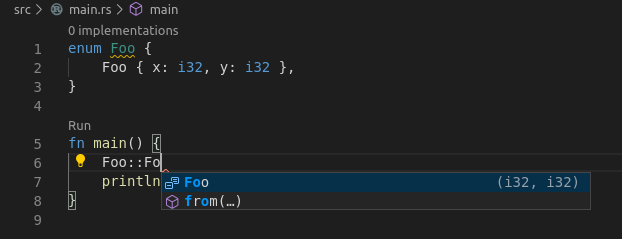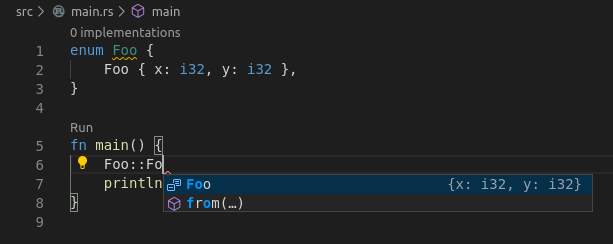| Commit message (Collapse) | Author | Age | Files | Lines |
|---|
| |
|
|
|
|
|
|
|
|
|
|
|
|
| |
To test whether the receiver type matches for the impl, we unify the given self
type (in this case `HashSet<{unknown}>`) with the self type of the
impl (`HashSet<?0>`), but if the given self type contains Unknowns, they won't
be unified with the variables in those places. So we got a receiver type that
was different from the expected one, and concluded the impl doesn't match.
The fix is slightly hacky; if after the unification, our variables are still
there, we make them fall back to Unknown. This does make some sense though,
since we don't want to 'leak' the variables.
Fixes #3547.
|
| | |
|
| | |
|
| | |
|
| | |
|
| | |
|
| |
|
|
|
| |
This slows down analysis-stats a bit (~5% in my measurement), but improves
incremental checking a lot because we can reuse trait solve results.
|
| |
|
|
|
|
|
|
|
|
| |
To do this we need to carry around the original resolution a bit, because `Self`
gets resolved to the actual type immediately, but you're not allowed to write
the equivalent type in a projection. (I tried just comparing the projection base
type with the impl self type, but that seemed too dirty.) This is basically how
rustc does it as well.
Fixes #3249.
|
| | |
|
| | |
|
| |\
| |
| |
| |
| |
| |
| |
| |
| |
| |
| |
| | |
3494: Implement include macro r=matklad a=edwin0cheng
This PR implement builtin `include` macro.
* It does not support include as expression yet.
* It doesn't consider `env!("OUT_DIR")` yet.
Co-authored-by: Edwin Cheng <[email protected]>
|
| | | |
|
| | |
| |
| |
| | |
Fixes #3306.
|
| |/
|
|
| |
cc #2236
|
| | |
|
| | |
|
| | |
|
| | |
|
| | |
|
| |\ \
| | |
| | |
| | |
| | |
| | |
| | |
| | |
| | |
| | |
| | |
| | |
| | |
| | |
| | |
| | |
| | |
| | | |
3397: Minimal viable meta r=matklad a=matklad
bors r+
🤖
3398: Reformat? r=matklad a=matklad
bors r+
🤖
Co-authored-by: Aleksey Kladov <[email protected]>
|
| | |/ |
|
| |\ \
| |/
|/|
| |
| |
| |
| |
| |
| |
| |
| | |
3385: Fix #3373 r=matklad a=flodiebold
Basically, we need to allow variables in the caller self type to unify with the
impl's declared self type. That requires some more contortions in the variable
handling. I'm looking forward to (hopefully) handling this in a cleaner way when
we switch to Chalk's types and unification code.
Co-authored-by: Florian Diebold <[email protected]>
|
| | |
| |
| |
| |
| |
| |
| | |
Basically, we need to allow variables in the caller self type to unify with the
impl's declared self type. That requires some more contortions in the variable
handling. I'm looking forward to (hopefully) handling this in a cleaner way when
we switch to Chalk's types and unification code.
|
| | | |
|
| | | |
|
| | | |
|
| |/ |
|
| | |
|
| |
|
|
|
|
|
| |
It turns out rustc actually only unsizes array method receivers, so we don't
need to do any trait solving for this (at least for now).
Fixes #2670.
|
| | |
|
| |
|
|
|
|
|
|
|
| |
E.g. for `&{ some_string() }` in a context where a `&str` is expected, we
reported a mismatch inside the block. The problem is that we're passing an
expectation of `str` down, but the expectation is more of a hint in this case.
There's a long comment in rustc about this, which I just copied.
Also, fix reported location for type mismatches in macros.
|
| | |
|
| | |
|
| | |
|
| | |
|
| |
|
|
| |
It should only shift free vars (maybe the name isn't the best...)
|
| |
|
|
|
| |
The self type in the `dyn Trait` trait ref should always be ^0, but we didn't
put that in there in the bare case.
|
| | |
|
| |
|
|
| |
I'm looking forward to getting rid of this in favor of Chalk's implementation.
|
| | |
|
| | |
|
| |
|
|
|
|
|
|
|
| |
E.g. in `match x { None => ... }`, `None` is a path pattern (resolving to the
option variant), not a binding. To determine this, we need to try to resolve the
name during lowering. This isn't too hard since we already need to resolve names
for macro expansion anyway (though maybe a bit hacky).
Fixes #1618.
|
| |
|
|
| |
Fixes #3232.
|
| |\
| |
| |
| |
| |
| |
| |
| |
| |
| | |
3215: Exclude methods from non-parameter types introduced by generic constraints r=flodiebold a=lnicola
Fixes #3184.
r? @flodiebold
Co-authored-by: Laurențiu Nicola <[email protected]>
|
| | | |
|
| |/ |
|
| | |
|
| | |
|
| |\
| |
| |
| |
| |
| |
| |
| |
| |
| |
| |
| |
| |
| |
| |
| |
| |
| |
| |
| |
| | |
3169: Show record field names in Enum completion r=flodiebold a=adamrk
Adresses https://github.com/rust-analyzer/rust-analyzer/issues/2947.
Previously the details shown when autocompleting an Enum variant would look like the variant was a tuple even if it was a record:

This change will show the names of the fields for a record and use curly braces instead of parentheses:

This required exposing the type `adt::StructKind` from `ra_hir` and adding a function
```
kind(self, db: &impl HirDatabase) -> StructKind
```
in the `impl` of `EnumVariant`.
There was also a previously existing function `is_unit(self, db: &impl HirDatabase) -> bool` for `EnumVariant` which I removed because it seemed redundant after adding `kind`.
Co-authored-by: adamrk <[email protected]>
|
| | | |
|
